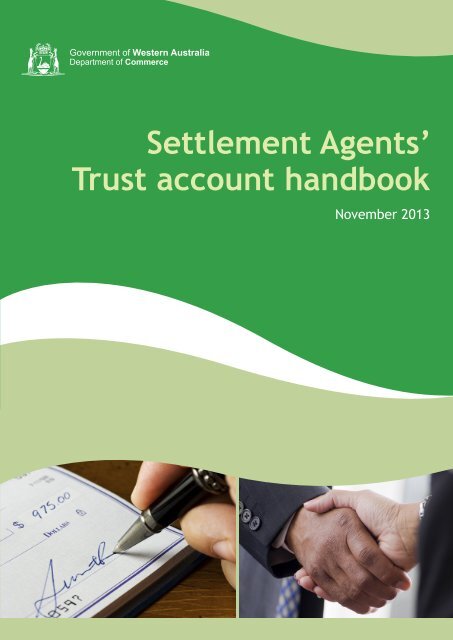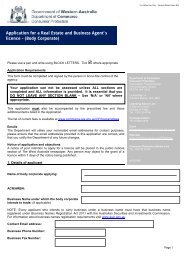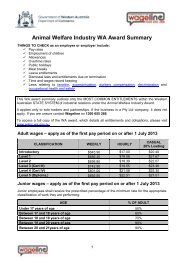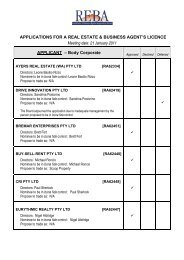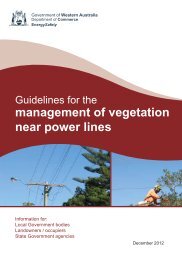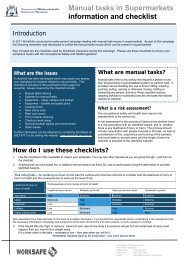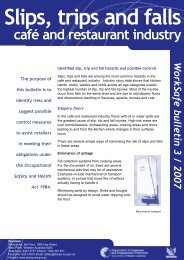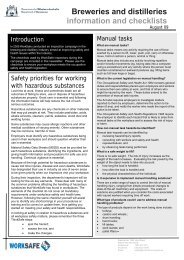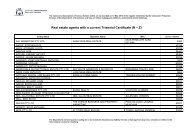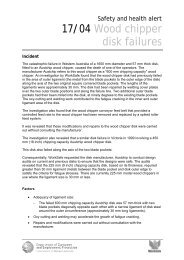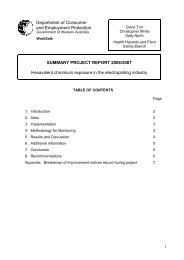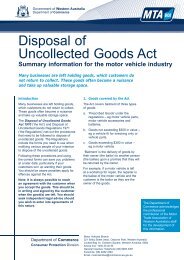Trust account handbook - Department of Commerce - wa.gov.au
Trust account handbook - Department of Commerce - wa.gov.au
Trust account handbook - Department of Commerce - wa.gov.au
Create successful ePaper yourself
Turn your PDF publications into a flip-book with our unique Google optimized e-Paper software.
Government <strong>of</strong> Western Australia<br />
<strong>Department</strong> <strong>of</strong> <strong>Commerce</strong><br />
Settlement Agents’<br />
<strong>Trust</strong> <strong>account</strong> <strong>handbook</strong><br />
November 2013
Disclaimer<br />
This booklet contains general information that <strong>wa</strong>s current<br />
at the time <strong>of</strong> publication. If you have specific inquiries about<br />
matters relating to your situation then you are strongly urged<br />
to seek independent pr<strong>of</strong>essional advice. The producers <strong>of</strong><br />
this publication expressly disclaim any liability arising out <strong>of</strong> a<br />
reader’s reliance on this publication.<br />
This publication <strong>wa</strong>s produced by the Consumer Protection<br />
Division <strong>of</strong> the <strong>Department</strong> <strong>of</strong> <strong>Commerce</strong>.<br />
This publication is available on request in other formats to assist<br />
people with special needs.
Table <strong>of</strong> Contents<br />
Introduction................................................................................................................. .3<br />
Using this publication.................................................................................................. .3<br />
Further information..................................................................................................... .3<br />
Part 1 trust <strong>account</strong>ing..................................................................................................4<br />
1.1 What is trust money?........................................................................................ .4<br />
1.2 What is meant by trust <strong>account</strong>ing?.................................................................. .4<br />
1.3 Why are there special requirements within the Act for the control<br />
<strong>of</strong> trust money?................................................................................................. .4<br />
1.4 What happens to the interest on trust <strong>account</strong>s?.............................................. .4<br />
1.5 Types <strong>of</strong> trust <strong>account</strong>s..................................................................................... .5<br />
General trust <strong>account</strong>s...................................................................................... .5<br />
Interest bearing trust <strong>account</strong>s.......................................................................... .5<br />
1.6 Quotation <strong>of</strong> tax file number (TFN)................................................................... .5<br />
1.7 Titling <strong>of</strong> trust <strong>account</strong>s..................................................................................... .5<br />
Titling <strong>of</strong> general trust <strong>account</strong>s........................................................................ .5<br />
Titling <strong>of</strong> interest bearing trust <strong>account</strong>s........................................................... .6<br />
Licensed entity.................................................................................................. .6<br />
1.8 Receiving and depositing trust money.............................................................. .6<br />
1.9 Opening, closing and amending trust <strong>account</strong>s................................................ .6<br />
1.10 What trust documents and records must be maintained?................................. .7<br />
1.11 How long must trust records be retained?........................................................ .7<br />
1.12 What use is made <strong>of</strong> the documents and records?........................................... .7<br />
1.13 Fees and disbursements................................................................................... .8<br />
Recovery <strong>of</strong> disbursements – cost-recovery only............................................. .8<br />
1.14 What must an agent do on becoming a<strong>wa</strong>re that a trust <strong>account</strong><br />
is overdrawn?.................................................................................................... .9<br />
1.15 Aspects <strong>of</strong> computerised trust <strong>account</strong>ing....................................................... 10<br />
Part 2 trust documents and records...........................................................................11<br />
2.1 Principles <strong>of</strong> trust <strong>account</strong> practice...................................................................11<br />
2.2 <strong>Trust</strong> receipts....................................................................................................11<br />
<strong>Trust</strong> receipt process.........................................................................................11<br />
<strong>Trust</strong> <strong>account</strong> receipts.......................................................................................11<br />
2.3 Interim receipts............................................................................................... .12<br />
2.4 <strong>Trust</strong> deposit forms......................................................................................... .13<br />
Bank deposit form........................................................................................... .13<br />
2.5 <strong>Trust</strong> <strong>account</strong> withdra<strong>wa</strong>ls............................................................................... .13<br />
2.6 Cash receipts journal and cash payments journal.......................................... .14<br />
1<br />
SETTLEMENT AGENTS’ TRUST ACCOUNT HANDBOOK
2<br />
2.7 <strong>Trust</strong> ledgers................................................................................................... .15<br />
Sample ledger................................................................................................. .16<br />
Transfer duty................................................................................................... .16<br />
2.8 Buffer <strong>account</strong>................................................................................................. .17<br />
2.9 <strong>Trust</strong> <strong>account</strong> transfer journal entries.............................................................. .17<br />
2.10 Recording withdra<strong>wa</strong>ls <strong>of</strong> fee entitlements..................................................... .18<br />
2.11 Balancing a trust <strong>account</strong> at the end <strong>of</strong> each month....................................... .18<br />
Balance per bank statement........................................................................... .20<br />
Add outstanding deposits................................................................................ .20<br />
Less unpresented cheques............................................................................. .20<br />
Balance per trust cash at bank....................................................................... .20<br />
Example: <strong>Trust</strong> <strong>account</strong> reconciliation statement........................................... .21<br />
PART 3 TRUST ACCOUNT AUDITS.............................................................................22<br />
3.1 What are the annual duties <strong>of</strong> an agent regarding trust <strong>account</strong> <strong>au</strong>dits?........ .22<br />
3.2 What are an agent’s duties in appointing an <strong>au</strong>ditor?..................................... .22<br />
3.3 What are an agent’s responsibilities to the <strong>au</strong>ditor?....................................... .23<br />
3.4 What are the duties <strong>of</strong> an <strong>au</strong>ditor?.................................................................. .23<br />
3.5 How should an agent respond to an <strong>au</strong>ditor’s recommendations?................. .24<br />
3.6 What are an agent’s duties in changing an <strong>au</strong>ditor?....................................... .24<br />
3.7 What is a quarterly <strong>au</strong>dit?............................................................................... .24<br />
3.8 What if a settlement agency closes?.............................................................. .24<br />
3.9 Unclaimed trust money................................................................................... .25<br />
PART 4. PREVENTING THEFT AND FRAUD...............................................................27<br />
4.1 Early indicators <strong>of</strong> theft and fr<strong>au</strong>d................................................................... .27<br />
4.2 Computer systems.......................................................................................... .28<br />
4.3 Bank reconciliations........................................................................................ .28<br />
4.4 Transfer journals............................................................................................. .29<br />
4.5 Receipt books................................................................................................. .29<br />
4.6 Agency management...................................................................................... .29<br />
4.7 Cash payments or cheque payments............................................................. .29<br />
4.8 <strong>Trust</strong> <strong>account</strong> management............................................................................ .30<br />
4.9 What must an agent do on becoming a<strong>wa</strong>re <strong>of</strong> fr<strong>au</strong>d or theft?....................... .30<br />
Glossary.................................................................................................................... .31<br />
SETTLEMENT AGENTS’ TRUST ACCOUNT HANDBOOK
Introduction<br />
The Settlement Agents Act 1981 (the Act) requires the strict maintenance <strong>of</strong> a formal set <strong>of</strong> trust<br />
<strong>account</strong> records that show at any time the state <strong>of</strong> a settlement agent’s trust <strong>account</strong>.<br />
This publication is designed to assist agents to establish and maintain a trust <strong>account</strong> recording<br />
system that complies with the Act. It also makes a number <strong>of</strong> recommendations that, while not<br />
prescribed by the Act, are considered to be best practice in maintaining trust <strong>account</strong>s by the<br />
Consumer Protection Division <strong>of</strong> the <strong>Department</strong> <strong>of</strong> <strong>Commerce</strong> (Consumer Protection).<br />
This publication is not a comprehensive <strong>account</strong>ing text for agents and familiarity with its content<br />
is not sufficient to satisfy the requirement that agents have a sound working knowledge <strong>of</strong> the Act<br />
and the Settlement Agents Regulations 1982 (the Regulations).<br />
Reference material and the latest Consumer Protection requirements can be found on its website.<br />
Visit www.commerce.<strong>wa</strong>.<strong>gov</strong>.<strong>au</strong>/consumerprotection/settlement<br />
Using this publication<br />
• Part One answers general questions about trust <strong>account</strong>ing.<br />
• Part Two examines the documents and records that constitute the trust <strong>account</strong>ing system,<br />
which must be maintained by the agent.<br />
• Part Three discusses the agent’s duties and responsibilities relating to trust <strong>account</strong> <strong>au</strong>dits.<br />
• Part Four looks at recommended practices for reducing theft and fr<strong>au</strong>d within a settlement<br />
business<br />
Further information<br />
3<br />
Additional copies <strong>of</strong> this publication can be downloaded free <strong>of</strong> charge from the Consumer<br />
Protection website at www.commerce.<strong>wa</strong>.<strong>gov</strong>.<strong>au</strong>/CP/Auditors<br />
The Settlement Agent newsletters and e-Bulletins are used to inform the industry <strong>of</strong> Consumer<br />
Protection policy and best practice, and may be used to convey information about Consumer’s<br />
Protections’ <strong>au</strong>diting requirements.<br />
Archived issues <strong>of</strong> the Settlement Agents News and e-Bulletins are available in the website’s<br />
publication section. Visit www.commerce.<strong>wa</strong>.<strong>gov</strong>.<strong>au</strong>/ConsumerProtection/Settlement<br />
SETTLEMENT AGENTS’ TRUST ACCOUNT HANDBOOK
PART 1 TRUST ACCOUNTING<br />
1.1 What is trust money?<br />
<strong>Trust</strong> money is money received or held by an agent on behalf <strong>of</strong> another person in relation to<br />
a settlement transaction. Deposits on property purchases, transfer duty, rates and taxes are all<br />
examples <strong>of</strong> trust money.<br />
Section 49(1) <strong>of</strong> the Act requires every licensee holding a current triennial certificate to maintain<br />
one or more trust <strong>account</strong>s exclusively for the purposes <strong>of</strong> the Act. Money received in the course<br />
<strong>of</strong> other business conducted by a settlement agent is not money received in the course <strong>of</strong> acting as<br />
a settlement agent. Such money is not considered as trust money under the Act and should not be<br />
held in the trust <strong>account</strong>.<br />
An agent has important fiduciary responsibilities in relation to trust <strong>account</strong> management. It is<br />
essential to remember that trust <strong>account</strong> money belongs to other people. The removal <strong>of</strong> money<br />
from a trust <strong>account</strong> for a reason other than a lawful and appropriate purpose is a criminal <strong>of</strong>fence.<br />
<strong>Trust</strong> funds must be kept separate from an agent’s general business funds at all times.<br />
A separate set <strong>of</strong> <strong>account</strong>ing records should be kept for each trust <strong>account</strong>.<br />
Refer: section 48 <strong>of</strong> the Act (definitions)<br />
1.2 What is meant by trust <strong>account</strong>ing?<br />
4<br />
<strong>Trust</strong> <strong>account</strong>ing is the general term used to cover the <strong>account</strong>ing records and practices required<br />
under the Act to enable agents to properly <strong>account</strong> for trust money in their possession.<br />
Agents holding a current triennial certificate must maintain one or more trust <strong>account</strong>s.<br />
All trust money must be held in a trust <strong>account</strong> in the agent’s name with an <strong>au</strong>thorised financial<br />
institution. Prescribed financial institutions include all banks and societies.<br />
Refer: section 49(1) <strong>of</strong> the Act and regulation 6A <strong>of</strong> the Regulations<br />
1.3 Why are there special requirements within the Act for the control <strong>of</strong><br />
trust money?<br />
Agents occupy a significant position <strong>of</strong> trust within the community and usually hold large sums <strong>of</strong><br />
money on their clients’ behalf. The trust <strong>account</strong>ing system aims to ensure that all trust money held<br />
by agents can be accurately <strong>account</strong>ed for at all times. <strong>Trust</strong> <strong>account</strong>s and <strong>au</strong>diting requirements<br />
increase public confidence in the services <strong>of</strong> agents.<br />
1.4 What happens to the interest on trust <strong>account</strong>s?<br />
Financial institutions holding agents’ general trust <strong>account</strong>s are required under the Act to pay a<br />
portion <strong>of</strong> the interest on these funds to Consumer Protection, as prescribed by the Regulations.<br />
The interest earned on trust <strong>account</strong>s funds various Consumer Protection services including<br />
education, advice, the Fidelity Guarantee Account partially and investigations on settlement matters<br />
for industry members and consumers.<br />
SETTLEMENT AGENTS’ TRUST ACCOUNT HANDBOOK
1.5 Types <strong>of</strong> trust <strong>account</strong>s<br />
General trust <strong>account</strong>s<br />
The Act requires that a licensed agent holding a current triennial certificate shall maintain one or<br />
more trust <strong>account</strong>s. All money held for a person in relation to a settlement transaction, such as<br />
a deposit and expenses, must be paid into a settlement agent trust <strong>account</strong>, which is titled in the<br />
prescribed manner.<br />
Refer: section 49(1) <strong>of</strong> the Act and regulation 6B <strong>of</strong> the Regulations.<br />
Interest bearing trust <strong>account</strong>s<br />
Section 49A <strong>of</strong> the Act allows agents to open separate interest bearing trust <strong>account</strong>s for individuals<br />
if a request is received in writing from the person paying the money. Before an agent can comply<br />
with a request for an individual interest bearing trust <strong>account</strong>, it must satisfy one <strong>of</strong> the following<br />
prescribed requirements:<br />
• the amount <strong>of</strong> money paid to the settlement agent exceeds $20,000; or<br />
• the transaction in respect <strong>of</strong> which moneys are paid is not to be settled within 60 days.<br />
(Regulation 6C <strong>of</strong> the Regulations)<br />
Interest earned on a separate interest bearing trust <strong>account</strong> is paid to the person requesting the<br />
<strong>account</strong>, not Consumer Protection. It must be brought to <strong>account</strong> each month.<br />
Requests from clients to open an interest bearing trust <strong>account</strong> must be made in writing and occur<br />
before settlement. Agents must comply with such requests where the aforementioned criteria are<br />
met and retain them in their files for <strong>au</strong>diting purposes.<br />
1.6 Quotation <strong>of</strong> tax file number (TFN)<br />
5<br />
When opening an interest bearing <strong>account</strong> in trust for a client, the client’s tax file number should be<br />
quoted to avoid tax being withheld at the top marginal rate.<br />
1.7 Titling <strong>of</strong> trust <strong>account</strong>s<br />
The titling <strong>of</strong> trust <strong>account</strong>s enables easy identification <strong>of</strong> settlement trust <strong>account</strong>s for agents,<br />
<strong>au</strong>ditors, financial institutions and Consumer Protection. When opening a trust <strong>account</strong>, an agent<br />
should ensure all details are recorded on bank documents.<br />
Examples <strong>of</strong> titling various categories <strong>of</strong> trust <strong>account</strong>s are provided below.<br />
Titling <strong>of</strong> general trust <strong>account</strong>s<br />
Agents are required to include the following information in the title <strong>of</strong> a general trust <strong>account</strong>:<br />
• Licensed entity name and business name as recorded on the triennial certificate.<br />
• SA TRUST A/C (the word ‘Account’ can be abbreviated or in full).<br />
• ‘TC’ followed by triennial certificate number <strong>of</strong> the licensed entity (up to five digits).<br />
Example<br />
ABC Pty Ltd (ABN 12 345 678 912) T/A XYZ Settlements<br />
SA TRUST A/C TC 12345<br />
Note: A licensed entity can be a body corporate, partnership or sole trader.<br />
SETTLEMENT AGENTS’ TRUST ACCOUNT HANDBOOK
Titling <strong>of</strong> interest bearing trust <strong>account</strong>s<br />
Agents are required to include the following in the titling <strong>of</strong> an interest bearing trust <strong>account</strong>:<br />
• Licensed entity name and business name as recorded on the triennial certificate in trust for the<br />
person making the request.<br />
• SA TRUST A/C – IB.<br />
• ‘TC’ followed by the triennial certificate number <strong>of</strong> the licensed entity (up to five digits).<br />
• The words ‘in trust for’ followed by name <strong>of</strong> the person who requested the separate <strong>account</strong>.<br />
Example<br />
ABC Pty Ltd (ABN 12 345 678 912) T/A XYZ Settlements in<br />
<strong>Trust</strong> for John Smith SA TRUST A/C – IB TC 12345<br />
Refer: regulation 6B <strong>of</strong> the Regulations<br />
Licensed entity<br />
6<br />
A real estate settlement agent and/or business settlement agent licence can be granted to a natural<br />
person (individual), a firm (partnership) or a body corporate (company). In order to trade as a real<br />
estate settlement agent and/or a business settlement agent, a licensee must hold a current triennial<br />
certificate.<br />
The person in bona fide control <strong>of</strong> an agency and branch managers must be licensed and hold<br />
a current triennial certificate. If there is a change in the person in bona fide control or in the<br />
directorship <strong>of</strong> a company, the agent must notify Consumer Protection in writing within 14 days.<br />
If there is a change in the partnership <strong>of</strong> a firm, with the exception <strong>of</strong> a new partner, the licence may<br />
cease to have effect. This means the firm is no longer able to continue trading and needs to apply<br />
for a new licence from Consumer Protection as well as undertake a termination <strong>au</strong>dit.<br />
1.8 Receiving and depositing trust money<br />
All trust money must be deposited in the trust <strong>account</strong> with an <strong>au</strong>thorised financial institution as<br />
soon as practicable after it is received unless there are unusual circumstances (eg unavailability <strong>of</strong><br />
convenient banking facilities). In this case, ‘as soon as practicable’ means by close <strong>of</strong> business the<br />
next business day.<br />
Refer: section 49(1) <strong>of</strong> the Act<br />
1.9 Opening, closing and amending trust <strong>account</strong>s<br />
Whenever a trust <strong>account</strong> is opened, closed, or amended, an agent must advise Consumer<br />
Protection in writing as soon as practicable. Consumer Protection has determined the notification<br />
must be sent within five working days.<br />
The notification should provide the name and number <strong>of</strong> the trust <strong>account</strong> and the name and<br />
address <strong>of</strong> the <strong>au</strong>thorised financial institution where the trust <strong>account</strong> is maintained. The date on<br />
which the change <strong>wa</strong>s made should also be included.<br />
Consumer Protection does not need to be advised about the opening, closing, or amending <strong>of</strong><br />
interest bearing trust <strong>account</strong>s.<br />
When opening a trust <strong>account</strong>, it is advisable to ensure an arrangement is made with the financial<br />
institution to accept third party cheques.<br />
Refer: section 49C(1) and (2) <strong>of</strong> the Act<br />
SETTLEMENT AGENTS’ TRUST ACCOUNT HANDBOOK
1.10 What trust documents and records must be maintained?<br />
It is essential that hard copies <strong>of</strong> the following records are maintained and can be produced at the<br />
request <strong>of</strong> the agent’s <strong>au</strong>ditor or an investigator/compliance <strong>of</strong>ficer <strong>of</strong> Consumer Protection.<br />
<strong>Trust</strong> documents and records that should be maintained include:<br />
• a record <strong>of</strong> money received for or on behalf <strong>of</strong> any other person;<br />
• trust receipt books register;<br />
• duplicates <strong>of</strong> every completed trust <strong>account</strong> deposit form;<br />
• trust <strong>account</strong> journals;<br />
• trust ledgers;<br />
• trust cheque books register;<br />
• records <strong>of</strong> trust money payments;<br />
• statement <strong>of</strong> trust monies;<br />
• register <strong>of</strong> securities;<br />
• trust <strong>account</strong> reconciliation statements;<br />
• requests for the issue <strong>of</strong> bank cheques; and<br />
• any other books, <strong>account</strong>s or records kept by an agent relating to trust money.<br />
It is also recommended that back-up copies <strong>of</strong> computer records be retained <strong>of</strong>fsite. This ensures<br />
the agent has access to the records in the event <strong>of</strong> error, falsification <strong>of</strong> records by an employee<br />
or physical damage to the system. A useful system is to maintain a set <strong>of</strong> discs <strong>of</strong>fsite with a disc<br />
labelled for each working day (eg Monday, Tuesday etc). The disc labelled for that particular day is<br />
brought back to the agency and used to back up records at the end <strong>of</strong> the day. The set <strong>of</strong> discs are<br />
then rotated the following week. With this system in place, all discs, except the one labelled for that<br />
day, are kept <strong>of</strong>fsite.<br />
Refer: section 58 <strong>of</strong> the Act<br />
7<br />
1.11 How long must trust records be retained?<br />
When an agent receives money for or on behalf <strong>of</strong> any other person, they must keep a record <strong>of</strong><br />
the money received. All trust records and documents are to be retained for a minimum period <strong>of</strong><br />
six years from the date the money <strong>wa</strong>s received.<br />
All agents need to be mindful <strong>of</strong> the taxation legislation with respect to the requirement to retain<br />
<strong>account</strong>ing records. Agents who are a body corporate should also be a<strong>wa</strong>re <strong>of</strong> the Corporations<br />
(Western Australia) Act 1990 with respect to record keeping (currently six years).<br />
Refer: section 50 (1)(b) <strong>of</strong> the Act and regulation 6F(b) <strong>of</strong> the Regulations<br />
1.12 What use is made <strong>of</strong> the documents and records?<br />
Documents and records enable the tracking <strong>of</strong> trust money held by an agent at any time in order<br />
to verify that money has been dealt with in accordance with the Act. The <strong>au</strong>ditor will conduct a<br />
sample-based <strong>au</strong>dit <strong>of</strong> the records when performing the annual <strong>au</strong>dit. As well as the annual <strong>au</strong>dit,<br />
the Commissioner may order an inspection <strong>of</strong> trust <strong>account</strong> records or an interim <strong>au</strong>dit <strong>of</strong> an<br />
agent’s trust <strong>account</strong>s at any time.<br />
An <strong>au</strong>dit is an examination by an independent person <strong>of</strong> the <strong>account</strong>s held by an agent. Unless the<br />
Commissioner approves otherwise, a registered company <strong>au</strong>ditor must conduct the <strong>au</strong>dit. An agent<br />
SETTLEMENT AGENTS’ TRUST ACCOUNT HANDBOOK
needs to maintain all documents and records relating to a trust <strong>account</strong> in a manner that enables<br />
them to be conveniently and properly <strong>au</strong>dited by the agency’s <strong>au</strong>ditor.<br />
Refer: section 49(6) <strong>of</strong> the Act<br />
Other duties <strong>of</strong> agents relating to <strong>au</strong>dits are discussed in part three.<br />
1.13 Fees and disbursements<br />
Under section 49(4) <strong>of</strong> the Act, disbursements <strong>of</strong> money from a trust <strong>account</strong> must be directly<br />
associated with the settlement <strong>of</strong> the real estate or business transaction that incurred those<br />
disbursements.<br />
An agent is required to transfer any settlement fee entitlement, gained from a settlement<br />
transaction, from the trust <strong>account</strong> to their agency’s general <strong>account</strong> before using that entitlement<br />
to meet general operating expenses. The agent cannot pay general operating expenses or<br />
personal expenses direct from the trust <strong>account</strong>. Fees should be transferred to the agent’s general<br />
<strong>account</strong> at least weekly, as best practice.<br />
In addition, an agent is only entitled to a settlement fee if all the following requirements have been<br />
met:<br />
• the settlement agent is licensed and holds a current triennial certificate when the services are<br />
provided (section 43(1));<br />
• the settlement agent has a valid appointment to act in writing (signed by the person for whom<br />
the services are being provided) before the services are rendered (section 43(1)); and<br />
8<br />
• the appointment to act complies with the requirements <strong>of</strong> section 43(2).Upon request from the<br />
client, the settlement agent must provide a scale <strong>of</strong> remuneration and an estimate <strong>of</strong> the cost <strong>of</strong><br />
the services in respect <strong>of</strong> the particular settlement.<br />
Refer: section 43 and 44 <strong>of</strong> the Act<br />
Recovery <strong>of</strong> disbursements – cost-recovery only<br />
Settlement agents may recover disbursement costs incurred in the course <strong>of</strong> a settlement from<br />
their clients. Disbursement costs include telephone calls, facsimiles, photocopying, postage<br />
and stationery. Where disbursements <strong>of</strong> this nature are being recovered, Consumer Protection<br />
considers it best practice for settlement agents to keep an individual record on the client’s file to<br />
verify the actual expenses were incurred and claimed.<br />
Agents should al<strong>wa</strong>ys keep in mind that the recovery <strong>of</strong> disbursement expenses is based on<br />
cost-recovery only. As labour costs are part <strong>of</strong> the settlement fee, they are not to be included in<br />
calculating disbursement charges. For example, the agent’s labour in photocopying cannot be<br />
charged as a disbursement.<br />
Agents sometimes have difficulty working out recovery costs for photocopying. A suggested method<br />
to calculate photocopy costs is for the agent to calculate the cost <strong>of</strong> a single sheet <strong>of</strong> paper plus<br />
the operational cost per copy (how much the photocopier costs to copy one sheet <strong>of</strong> paper). First,<br />
the operating cost <strong>of</strong> the photocopier must be determined, which is done by adding the average<br />
cost <strong>of</strong> leasing or renting a photocopier per month (if the agent owns the photocopier, the average<br />
can be determined by spreading the cost over the life <strong>of</strong> the photocopier, usually three to five<br />
years), plus the monthly average maintenance charge. To work out the operational cost per copy,<br />
the operating cost <strong>of</strong> the photocopier is then divided by the total number <strong>of</strong> copies per month, (the<br />
usual operational cost per page is between two to three cents).<br />
SETTLEMENT AGENTS’ TRUST ACCOUNT HANDBOOK
The following calculation can be used to work out the net cost per period:<br />
Net cost per period =<br />
Cost <strong>of</strong> paper per month + operational cost (average cost <strong>of</strong> photocopier<br />
per month) + average cost <strong>of</strong> maintenance charge per month<br />
Number <strong>of</strong> copies per month<br />
Settlement agents who have been keeping individual disbursement sheets for a sufficient period <strong>of</strong><br />
time may use that information to work out a flat charge to all clients for disbursements. However,<br />
the charge must still be justified on the basis <strong>of</strong> a minimum cost <strong>of</strong> recovery. To do this, calculate<br />
the lowest number <strong>of</strong> each type <strong>of</strong> disbursement for a basic settlement for both seller and buyer<br />
For example, the lowest number <strong>of</strong> phone calls in a basic settlement would be used as a basis for<br />
developing a flat charge for all settlements where disbursements are involved. Agents cannot use<br />
the average bec<strong>au</strong>se this would result in some clients being overcharged, which is prohibited by<br />
the Act.<br />
Agents using a flat charge method should keep individual disbursement sheets for a period <strong>of</strong> time<br />
at regular intervals to ensure charges remain accurate and can therefore be justified.<br />
Where an agent charges disbursements greater than the actual cost incurred, the excess amount<br />
could be considered as remuneration. If total remuneration exceeds the scheduled fee, the agent<br />
could be in breach <strong>of</strong> the Act.<br />
1.14 What must an agent do on becoming a<strong>wa</strong>re that a trust <strong>account</strong><br />
is overdrawn?<br />
Section 49C(3) <strong>of</strong> the Act requires the financial institution and the agent to inform the<br />
Commissioner whenever a settlement agent’s trust <strong>account</strong> is overdrawn. Regardless <strong>of</strong> the<br />
amount overdrawn or whether the overdrawn amount is a result <strong>of</strong> a bank error, Consumer<br />
Protection must be notified immediately.<br />
The notification must include the name and number <strong>of</strong> the trust <strong>account</strong> and the amount by which<br />
the trust <strong>account</strong> is overdrawn. The notification must be sent to the Commissioner. This is to be<br />
done within five working days, as required by Consumer Protection.<br />
Agents should also be a<strong>wa</strong>re <strong>of</strong> the requirements <strong>of</strong> Rules 23 and 24 <strong>of</strong> the Settlement Agents<br />
Code <strong>of</strong> Conduct 1982 (the Code <strong>of</strong> Conduct).<br />
Rule 23 <strong>of</strong> the Code <strong>of</strong> Conduct requires agents to immediately balance their trust <strong>account</strong> if it<br />
becomes deficient, and to inform everyone who could be affected by the deficiency. Rule 24 <strong>of</strong> the<br />
Code <strong>of</strong> Conduct states that a licensee must not place their clients’ money into a trust <strong>account</strong> they<br />
know to be deficient.<br />
For guidance on what to do in the event <strong>of</strong> fr<strong>au</strong>d or theft from the trust <strong>account</strong>, please see<br />
part four.<br />
Further comments in respect <strong>of</strong> trust <strong>account</strong> practices are made under Section 2.1 Principles <strong>of</strong><br />
<strong>Trust</strong> Account Practice.<br />
Refer: section 49C(3) <strong>of</strong> the Act<br />
9<br />
SETTLEMENT AGENTS’ TRUST ACCOUNT HANDBOOK
1.15 Aspects <strong>of</strong> computerised trust <strong>account</strong>ing<br />
The requirements <strong>of</strong> the Act and the Regulations apply to all computerised trust <strong>account</strong>ing systems.<br />
Before signing a contract to purchase or lease a computer system, an agent should check the<br />
s<strong>of</strong>t<strong>wa</strong>re included is capable <strong>of</strong> producing trust records that comply with the requirements <strong>of</strong> the Act.<br />
Agents are advised to discuss the selection <strong>of</strong> a system with their <strong>au</strong>ditor if they are contemplating<br />
the purchase <strong>of</strong> a computer system. The agent’s <strong>au</strong>ditor can then advise on the types <strong>of</strong> records that<br />
must be maintained and generated.<br />
As a safeguard, when buying a computer system, some agents have negotiated a condition in their<br />
contract that requires the s<strong>of</strong>t<strong>wa</strong>re to comply with the Act and any costs in modifying the system are<br />
at the supplier’s expense.<br />
Consumer Protection does not approve <strong>of</strong> or endorse any computer system or s<strong>of</strong>t<strong>wa</strong>re package.<br />
Any claims made by suppliers that approval has been granted could be a misrepresentation and<br />
should be reported to Consumer Protection.<br />
While the day-to-day upkeep <strong>of</strong> trust <strong>account</strong> records is delegated to <strong>of</strong>fice staff in many agencies,<br />
the licensee is responsible for all trust <strong>account</strong> records. For this reason, it is essential the agency’s<br />
licensee is fully conversant with the computer system installed. Full use should be made <strong>of</strong> the<br />
checks and controls that are integrated into the system. Systems should <strong>au</strong>tomatically generate<br />
a daily report so that trust <strong>account</strong> records can be monitored on a daily basis for discrepancies<br />
and errors. The agency’s licensee should personally check the daily report that is generated and<br />
immediately address any irregularities that may be identified.<br />
10<br />
SETTLEMENT AGENTS’ TRUST ACCOUNT HANDBOOK
PART 2 TRUST DOCUMENTS AND RECORDS<br />
The role <strong>of</strong> trust documents and records, as well as the prescribed requirements, are explained<br />
in this section. Where needed, a model that meets the requirements <strong>of</strong> the Act is shown. It should<br />
be understood, however, that models serve only as examples. While legislation prescribes<br />
the information that must be recorded, it does not prescribe the <strong>wa</strong>y that information must be<br />
presented.<br />
2.1 Principles <strong>of</strong> trust <strong>account</strong> practice<br />
While it is impractical to summarise good trust <strong>account</strong> bookkeeping practice in a few sentences,<br />
the following broad principles apply:<br />
• documents are completed immediately;<br />
• records are written up by the end <strong>of</strong> the next business day;<br />
• trust money is banked by close <strong>of</strong> business <strong>of</strong> the next business day (unless the Act allows<br />
otherwise) and in the same form it <strong>wa</strong>s received (eg cash received must be banked as cash);<br />
• records <strong>of</strong> all transactions are kept and transactions with no documentary evidence are<br />
recorded in the transfer journal;<br />
• reconciliation statements, prepared at least monthly, are completed accurately and on time;<br />
• fee entitlements are not deducted from the trust money until after settlement;<br />
• each client must have a separate trust ledger <strong>account</strong> and each individual trust ledger <strong>account</strong><br />
should never go into debit;<br />
• agents with computerised <strong>account</strong>ing systems maintain records in a manner that can be<br />
conveniently and properly <strong>au</strong>dited (<strong>au</strong>ditors can advise which documents must be provided in<br />
hard copy); and<br />
• back-up computer records are kept <strong>of</strong>fsite.<br />
11<br />
2.2 <strong>Trust</strong> receipts<br />
<strong>Trust</strong> receipt process<br />
When trust <strong>account</strong>s are kept manually and payment is made in person, a receipt must be<br />
provided to the person at the time <strong>of</strong> payment. A duplicate, marked as such, must also be retained.<br />
If a computer system is being used, a printed receipt needs to be issued and a record <strong>of</strong> the<br />
transaction maintained. If a payment is made by cheque through the mail, the receipt should be<br />
provided as soon as possible. A receipt does not have to be issued if the money is received by<br />
electronic transfer, however, a record <strong>of</strong> the money received must be kept (ie a copy <strong>of</strong> the deposit<br />
slip or bank statement).<br />
<strong>Trust</strong> <strong>account</strong> receipts<br />
It is a requirement that all trust receipts show the following information:<br />
• the name <strong>of</strong> the holder <strong>of</strong> the triennial certificate, and the business name <strong>of</strong> the holder, that is<br />
recorded in the register;<br />
• a number or letter, or a combination <strong>of</strong> both, in consecutive order to allow the receipt to be<br />
uniquely identified;<br />
• the date the money <strong>wa</strong>s received;<br />
• the name <strong>of</strong> the person paying the money;<br />
SETTLEMENT AGENTS’ TRUST ACCOUNT HANDBOOK
• the amount <strong>of</strong> money received;<br />
• a brief description <strong>of</strong> the purpose <strong>of</strong> the payment; and<br />
• if the receipt is hand-written, the name <strong>of</strong> the person receiving the money evidenced by the<br />
signature <strong>of</strong> that person.<br />
Refer: regulation 6E <strong>of</strong> the Regulations<br />
When money has been received by electronic transfer, an agent must ensure a record is kept to<br />
allow the receipt <strong>of</strong> the money to be uniquely identified, by including:<br />
• a number or letter, or combination <strong>of</strong> both, in consecutive order that allows the record to be<br />
uniquely identified;<br />
• the date the money <strong>wa</strong>s received;<br />
• the name <strong>of</strong> the person paying the money;<br />
• the amount <strong>of</strong> the money received; and<br />
• a description <strong>of</strong> the purpose <strong>of</strong> the payment.<br />
Refer: regulation 6E(b)(c)(d)(e) and (f) and regulation 6F(3) <strong>of</strong> the Regulations<br />
The example below demonstrates a general purpose trust receipt format that meets the<br />
requirements under the Regulations:<br />
ABC PTY LTD ABN 12 345 678 912 T/A XYZ Settlements<br />
12<br />
Licensed Real Estate Settlement Agent<br />
<strong>Trust</strong> Account Receipt<br />
16 Horizon Street, Perth 6000 No: 00001<br />
Date........../............ /..............<br />
Received from.........................................................................................................................<br />
Address...................................................................................................................................<br />
The sum <strong>of</strong>..............................................................................................................................<br />
For...........................................................................................................................................<br />
For and on behalf <strong>of</strong> ABC Pty Ltd ABN 12 345 678 912<br />
Signed.....................................................................................................................................<br />
Cheque $...................... Cash $........................<br />
(name <strong>of</strong> signatory)<br />
Total $..............................................................<br />
All receipts should be posted to the cash receipts journal by the next working day.<br />
2.3 Interim receipts<br />
The use <strong>of</strong> interim receipts is not encouraged. However, there are certain circumstances when<br />
an interim receipt may need to be issued (eg when the agent’s printer is out <strong>of</strong> order). In these<br />
situations, a duplicate <strong>of</strong> the interim receipt should be retained in the records and the interim<br />
receipt should be immediately followed by a formal trust receipt and cross-referenced to the interim<br />
receipt.<br />
When using a manual system to issue interim receipts, cross-referencing information should be<br />
included in the trust ledger. If a computer system is used, the formal trust receipt should be<br />
SETTLEMENT AGENTS’ TRUST ACCOUNT HANDBOOK
cross-referenced against the interim receipt in the computer system.<br />
When agents have issued interim receipts, they should review them on a weekly basis to ensure<br />
the formal trust receipt has been issued.<br />
2.4 <strong>Trust</strong> deposit forms<br />
Agents should make and retain a copy <strong>of</strong> every completed trust <strong>account</strong> deposit form.<br />
<strong>Trust</strong> <strong>account</strong> deposit forms should show:<br />
• the date <strong>of</strong> payment to the <strong>au</strong>thorised financial institution;<br />
• the name and number <strong>of</strong> the agent’s trust <strong>account</strong>; and<br />
• if the money is paid by cheque, the name <strong>of</strong> the drawer and the name and branch <strong>of</strong> the<br />
financial institution against which the cheque <strong>wa</strong>s drawn.<br />
Most standard bank deposit books issued by trading banks include this information.<br />
To assist in checking that all money paid into the trust bank <strong>account</strong> matches a trust <strong>account</strong><br />
receipt, it is useful for agencies with more than one branch to note the serial numbers <strong>of</strong> the<br />
receipts <strong>of</strong> the money banked on the copy <strong>of</strong> the bank deposit form. This practice assists in<br />
bookkeeping and will aid the <strong>au</strong>ditor when checking details <strong>of</strong> receipts against money banked.<br />
For example:<br />
Bank deposit form<br />
East branch <strong>of</strong>fice receipts: 1642 – 1649 $6,471.00<br />
West branch <strong>of</strong>fice receipts: 1974 – 1976 $267.48<br />
Total deposit $6,738.48<br />
The trust <strong>account</strong> deposit book should be clearly identified to distinguish it from the agent’s general<br />
<strong>account</strong> deposit book.<br />
13<br />
2.5 <strong>Trust</strong> <strong>account</strong> withdra<strong>wa</strong>ls<br />
At no time should a trust ledger <strong>account</strong> have a debit balance.<br />
As a matter <strong>of</strong> best practice, all withdra<strong>wa</strong>ls from a trust <strong>account</strong> should be made by electronic<br />
transfer or a trust cheque. Where a trust cheque is used, an agent must retain the cheque butts<br />
and ensure such cheque butts contain all relevant information.<br />
To reduce the possibility <strong>of</strong> theft or fr<strong>au</strong>d, it is recommended that trust <strong>account</strong> cheques are marked<br />
‘Not Negotiable’ and are not made payable in cash. The agent may ask the bank to mark each<br />
cheque ‘Not Negotiable - Account Payee Only’ or purchase a rubber stamp to mark the cheques.<br />
Stamping all trust <strong>account</strong> cheques when they are received from the bank will ensure no cheques<br />
are inadvertently issued without this protection. Alternatively, the agent can cross out ‘or bearer’<br />
and write ‘order’ on the cheques to ensure that the amount is only paid to the correct person.<br />
It is also important for the agent to ask the bank to stamp the trust <strong>account</strong> cheque book with the<br />
name <strong>of</strong> the <strong>account</strong> or, alternatively, to write or stamp the name <strong>of</strong> the <strong>account</strong> on each cheque.<br />
This will reduce the chance <strong>of</strong> an inadvertent withdra<strong>wa</strong>l <strong>of</strong> trust funds from the trust <strong>account</strong>.<br />
In most circumstances, the person in bona fide control should be a compulsory signatory to the<br />
trust <strong>account</strong> to ensure that adequate control is exercised over employees <strong>of</strong> the agency. This<br />
measure will reduce the possibility <strong>of</strong> inadvertent errors and theft. In some large agencies, it may<br />
not be possible for the person in bona fide control to be a compulsory signatory and in this case,<br />
SETTLEMENT AGENTS’ TRUST ACCOUNT HANDBOOK
egular checks should be carried out on the work <strong>of</strong> the person responsible.Before drawing a trust<br />
<strong>account</strong> cheque, the relevant client trust ledger <strong>account</strong> should be reviewed to ensure the <strong>account</strong><br />
contains sufficient cleared funds to cover the payment that is to be made. If the money has been<br />
paid by cheque, allow sufficient time for the cheque to clear before drawing on it. Check with the<br />
bank for the appropriate clearance time.<br />
When monies being held on behalf <strong>of</strong> a buyer and seller are disputed, the settlement agent must<br />
obtain the prior written consent <strong>of</strong> all relevant parties before releasing the disputed funds.<br />
A cheque butt or other record should show similar information to that shown on receipts, including:<br />
• the date <strong>of</strong> the cheque;<br />
• the name <strong>of</strong> the person to whom the payment is to be made;<br />
• the serial number <strong>of</strong> the cheque;<br />
• the amount <strong>of</strong> the payment; and<br />
• a brief description identifying the nature <strong>of</strong> the transaction and the purpose for which the<br />
payment is made.<br />
The below example shows the minimum information that should be shown on a cheque butt or on a<br />
computer printout:<br />
14<br />
Date:<br />
DD/MM/20XX<br />
Payment to:<br />
Registrar <strong>of</strong> Titles<br />
Reason for payment: Registration fees for File # 154/03<br />
Amount: $16<br />
Cheque Serial Number: 767110<br />
Cheque books should be stored in a secure place to restrict access to <strong>au</strong>thorised people only.<br />
2.6 Cash receipts journal and cash payments journal<br />
All receipts and payments <strong>of</strong> trust money are to be summarised in the trust <strong>account</strong> cash journals.<br />
The journals are updated each time money is paid into or out <strong>of</strong> the trust <strong>account</strong>. The journals also<br />
provide a sequential and chronological record <strong>of</strong> trust <strong>account</strong> receipts and payments.<br />
If using a computerised system, the procedures and terminology may be different but the same<br />
essential information must be recorded. The journals are used to update the trust <strong>account</strong> ledger<br />
and for the preparation <strong>of</strong> the monthly trust <strong>account</strong> reconciliation statement. The trust <strong>account</strong><br />
cash journals must contain sufficient particulars <strong>of</strong> all receipts, payments and transfers to enable<br />
adequate details <strong>of</strong> the transactions to be posted into the trust <strong>account</strong> ledger.<br />
The receipts section is prepared from the duplicates <strong>of</strong> trust <strong>account</strong> receipts. Each receipt number<br />
must be entered in strict numerical sequence. If a receipt is cancelled, the number must still be<br />
entered and the word ‘cancelled’ written beside it. The original copy <strong>of</strong> any cancelled receipt should<br />
be retained for inspection by the agent’s <strong>au</strong>ditor.<br />
Recommended information to be recorded in the cash receipts journal includes:<br />
• date;<br />
• receipt number;<br />
• from whom money <strong>wa</strong>s received;<br />
• trust ledger reference;<br />
SETTLEMENT AGENTS’ TRUST ACCOUNT HANDBOOK
• amount received; and<br />
• the total amount banked each day.<br />
The cash payments section <strong>of</strong> the journal must also be entered in strict numerical sequence from<br />
information recorded on the trust <strong>account</strong> cheque butts (or duplicates).<br />
Recommended information to be recorded in the cash payments journal includes:<br />
• date;<br />
• cheque number;<br />
• name <strong>of</strong> person to whom payment <strong>wa</strong>s made;<br />
• reason for payment;<br />
• trust ledger reference;<br />
• amount <strong>of</strong> payment; and<br />
• a subtotal <strong>of</strong> payments made to any one person on a particular date.<br />
Refer: section 49(6) <strong>of</strong> the Act<br />
2.7 <strong>Trust</strong> ledgers<br />
The trust ledger is the centrepiece <strong>of</strong> the trust <strong>account</strong>ing system as it summarises all <strong>of</strong> an agent’s<br />
trust <strong>account</strong> transactions. The trust ledger must show the details and amounts <strong>of</strong> the money held<br />
by the agent on their clients’ behalf at all times.<br />
A client trust ledger <strong>account</strong> must be opened for each settlement.<br />
The bank trust <strong>account</strong> and the individual client trust ledger <strong>account</strong>s must never go<br />
into debit.<br />
Client trust ledger <strong>account</strong>s must satisfy the following criteria irrespective <strong>of</strong> whether they are<br />
produced manually or electronically:<br />
15<br />
• individual client trust ledger <strong>account</strong>s must show a continuous running balance in order to<br />
disclose each client’s entitlements at any time (it is not sufficient that entitlements can be<br />
calculated or obtained by reference to subsidiary records);<br />
• all transactions must be shown in their correct chronological sequence and the date <strong>of</strong> each<br />
transaction must be shown (if not done, the amounts recorded in the balance column will be<br />
meaningless and the client trust ledger <strong>account</strong>s will fail to show the true position as required);<br />
• the client trust ledger <strong>account</strong>s must be updated by close <strong>of</strong> the next business day;<br />
• where records are maintained electronically, the <strong>account</strong>s must be readily convertible into<br />
printed form (the ability to produce a visual image on a screen is not sufficient); and<br />
• all client trust ledger <strong>account</strong>s must contain sufficient detail so the nature <strong>of</strong> the transactions<br />
can be clearly understood.<br />
Each client trust ledger <strong>account</strong> must contain at least the following information:<br />
• the <strong>account</strong> number;<br />
• the name and address <strong>of</strong> an agent’s client;<br />
• the address <strong>of</strong> the property involved;<br />
• the names <strong>of</strong> other parties to the transaction;<br />
• the date <strong>of</strong> each transaction;<br />
• the names <strong>of</strong> people from whom money <strong>wa</strong>s received or to whom money <strong>wa</strong>s paid;<br />
SETTLEMENT AGENTS’ TRUST ACCOUNT HANDBOOK
• the reason for the movement <strong>of</strong> money;<br />
• the amount <strong>of</strong> the money paid or received;<br />
• either the cheque number, receipt number or transfer journal folio number that matches the<br />
movement <strong>of</strong> money; and<br />
• the balance <strong>of</strong> the <strong>account</strong>.<br />
A sample ledger layout is shown below:<br />
Sample ledger<br />
Client name<br />
Address:<br />
Account No:<br />
Description <strong>of</strong> transaction:<br />
...............................................................................................................................................................................................................................................................<br />
...............................................................................................................................................................................................................................................................<br />
...............................................................................................................................................................................................................................................................<br />
...............................................................................................................................................................................................................................................................<br />
...............................................................................................................................................................................................................................................................<br />
...............................................................................................................................................................................................................................................................<br />
...............................................................................................................................................................................................................................................................<br />
Date Particulars Jnl Ref Debit Credit Balance<br />
16<br />
Transfer duty<br />
Money for transfer duty (formerly stamp duty) should be held in a separate ledger within the agent’s<br />
trust <strong>account</strong>. Transfer duty money is collected from the buyer, deposited into the trust <strong>account</strong> and<br />
cleared from the trust <strong>account</strong> before stamping any documents. This is also a condition <strong>of</strong> ‘Online<br />
Stamping’, a facility <strong>of</strong>fered by the State Revenue section <strong>of</strong> the <strong>Department</strong> <strong>of</strong> Finance.<br />
Online Stamping enables agents to move transfer <strong>of</strong> duty money via an electronic lodgement <strong>of</strong><br />
monthly returns. This system replaces the previous disc-based facility, known as Collections by<br />
Return. Agents who stamp documents using Online Stamping before receiving transfer <strong>of</strong> duty<br />
money from the buyer or before ensuring that received trust funds have been cleared, are making<br />
a false declaration. By doing so, agents risk disciplinary action by the <strong>Department</strong> <strong>of</strong> Finance and<br />
may even lose their licence.<br />
Agents intending to use Online Stamping are encouraged to familiarise themselves with the terms<br />
and conditions on the Office <strong>of</strong> State Revenue section <strong>of</strong> the <strong>Department</strong> <strong>of</strong> Finance website at<br />
www.finance.<strong>wa</strong>.<strong>gov</strong>.<strong>au</strong><br />
SETTLEMENT AGENTS’ TRUST ACCOUNT HANDBOOK
2.8 Buffer <strong>account</strong><br />
Agents sometimes maintain a surplus amount within the trust <strong>account</strong> to absorb any inadvertent<br />
deficiencies that may arise from dishonoured bank cheques or bank charges.<br />
In no circumstances should extra funds be kept in the trust <strong>account</strong>.<br />
A buffer fund cannot be used to <strong>of</strong>fset bank fees or for any other reason. Agents should clear their<br />
commission or fees <strong>account</strong> to their general <strong>account</strong> at least weekly. Consumer Protection strongly<br />
recommends against the practice <strong>of</strong> retaining commissions and management fees in the trust<br />
<strong>account</strong> for an extended period <strong>of</strong> time.<br />
The removal <strong>of</strong> these excess funds from the trust <strong>account</strong> is for the benefit <strong>of</strong> all parties. If an agent<br />
maintains a buffer in a trust <strong>account</strong>, they will not be a<strong>wa</strong>re when the trust <strong>account</strong> is overdrawn.<br />
This means they are less likely to identify poor trust <strong>account</strong> management practices or fr<strong>au</strong>d by<br />
employees. The person in bona fide control is responsible for checking each ledger <strong>account</strong> each<br />
month to determine if specific ledgers are overdrawn and to correct any errors.<br />
2.9 <strong>Trust</strong> <strong>account</strong> transfer journal entries<br />
An agent may wish to transfer funds between client trust ledger <strong>account</strong>s within the trust ledger.<br />
In this situation, it is not necessary to withdraw the funds from the bank trust <strong>account</strong> and redeposit<br />
them. Rather, the transfer can be achieved through appropriate client trust ledger <strong>account</strong> entries<br />
and recorded in the trust <strong>account</strong> transfer journal.<br />
The role <strong>of</strong> the trust <strong>account</strong> transfer journal is to provide a clear <strong>au</strong>dit trail between taking money<br />
from one client ledger and crediting it to another client ledger. The use <strong>of</strong> a transfer journal is not<br />
compulsory unless transfers are made.<br />
When transferring funds between client ledgers it is important to remember that, in some cases,<br />
an <strong>au</strong>thority in writing will be required from the client concerned (ie the sale <strong>of</strong> one property and<br />
purchase <strong>of</strong> another).<br />
The trust <strong>account</strong> transfer journal must include the following information:<br />
17<br />
• the date <strong>of</strong> transfer;<br />
• the name <strong>of</strong> the trust ledger <strong>account</strong> from which the money is transferred;<br />
• the name <strong>of</strong> the trust ledger <strong>account</strong> to which the money is transferred;<br />
• a notation or code indicating the purpose for which the money is transferred; and<br />
• the amount <strong>of</strong> money transferred.<br />
Where more than one trust <strong>account</strong> is held by an agent, a separate transfer journal must be<br />
maintained for each trust <strong>account</strong>.<br />
Transfer journal entries equate to both a payment and a receipt <strong>of</strong> trust money and therefore<br />
must be fully recorded. Explanatory notes for each journal entry should be included. Receipt and<br />
payment transactions should be supported by signed trust documents (receipt forms and cheque<br />
butts). The agent should also sign transfer journal entries as evidence <strong>of</strong> the agent’s <strong>au</strong>thorisation<br />
<strong>of</strong> the entry. To reduce the incidence <strong>of</strong> error or theft, the person in bona fide control should sign <strong>of</strong>f<br />
all entries in the trust <strong>account</strong> transfer journal.<br />
SETTLEMENT AGENTS’ TRUST ACCOUNT HANDBOOK
A suggested layout for the journal is as follows:<br />
<strong>Trust</strong> <strong>account</strong> transfer journal (general journal)<br />
Date Particulars Ledger<br />
reference<br />
DR<br />
Transfer<br />
from<br />
$ c<br />
CR<br />
Transfer<br />
to<br />
$ c<br />
4/8/13 James Smythe<br />
A/C 4403<br />
4/8/13 John Smythe<br />
A/C 4407<br />
Money<br />
incorrectly<br />
deposited to<br />
<strong>account</strong> 4003 on<br />
31/07/13<br />
J1 10,000<br />
W3 10,000 Person in bona fide<br />
control’s signature<br />
M Brown<br />
2.10 Recording withdra<strong>wa</strong>ls <strong>of</strong> fee entitlements<br />
18<br />
Fees can be transferred from the client’s ledger <strong>account</strong> after settlement to a ‘fees’ ledger <strong>account</strong><br />
within the trust <strong>account</strong>. The ‘fees’ <strong>account</strong> should be cleared at least weekly to the general<br />
<strong>account</strong> <strong>of</strong> the agent.<br />
When a fee entitlement is due to the agent, a trust cheque can be drawn to transfer the funds<br />
from the client’s ledger <strong>account</strong> to the agent, or transferred to the agent’s general bank <strong>account</strong> by<br />
electronic transfer.<br />
When fees are due to the agent from more than one client, it is not necessary to draw individual<br />
trust <strong>account</strong> cheques for each fee entitlement. A single trust <strong>account</strong> cheque may be prepared<br />
instead or the funds may be transferred electronically, provided the transfer journal or cash<br />
payments journal entries are made listing each fee withdra<strong>wa</strong>l and the client trust ledger <strong>account</strong> to<br />
which it relates.<br />
2.11 Balancing a trust <strong>account</strong> at the end <strong>of</strong> each month<br />
To ensure the requirements <strong>of</strong> section 49(6)(d) <strong>of</strong> the Act are met, an agent should complete a trust<br />
<strong>account</strong> reconciliation statement at the close <strong>of</strong> business each month. This statement reconciles<br />
the cash records <strong>of</strong> the business with the records <strong>of</strong> the bank. It reconciles the balances <strong>of</strong> the<br />
trust <strong>account</strong> cash book, the bank trust <strong>account</strong> statement and the total <strong>of</strong> the clients’ trust <strong>account</strong><br />
ledgers. The purpose <strong>of</strong> the exercise is to match all three totals after taking into <strong>account</strong> any<br />
reconciling items.The monthly trust <strong>account</strong> reconciliation should be:<br />
• as at the close <strong>of</strong> business <strong>of</strong> the last day <strong>of</strong> the month;<br />
• completed within 10 working days after the end <strong>of</strong> each month;<br />
• verified, signed and dated by the agent, or if the agent is a corporation, the person in bona fide<br />
control, even if there are no funds in the <strong>account</strong>; and<br />
• retained for <strong>au</strong>diting purposes.<br />
SETTLEMENT AGENTS’ TRUST ACCOUNT HANDBOOK
Regular monitoring <strong>of</strong> trust <strong>account</strong> transactions and <strong>account</strong> balances may help prevent the<br />
successful fr<strong>au</strong>dulent transfer <strong>of</strong> money from a trust <strong>account</strong>, as the bank may be in time to hold or<br />
reverse the transaction. Agents should ensure they only access their banking details in a secure<br />
environment and all devices have appropriate and up-to-date security s<strong>of</strong>t<strong>wa</strong>re.<br />
In preparing a bank reconciliation, which is a major part <strong>of</strong> a trust <strong>account</strong> reconciliation, the agent<br />
should be a<strong>wa</strong>re that while the bank also records cash receipts and cash payments, the bank<br />
records it from a different perspective to that <strong>of</strong> an agent. For example, cash receipts that are<br />
debits in the agent’s ‘cash at bank <strong>account</strong>’ entries in the journal are shown as credits on the bank<br />
statement. Similarly, cash payments appearing as credits in the ‘cash at bank <strong>account</strong>’ entries in<br />
the agent’s journal are shown as debits on the bank statement.<br />
Often, there will be discrepancies between the trust records and the bank statement. Once the<br />
agent becomes familiar with these discrepancies, the process <strong>of</strong> trust <strong>account</strong> reconciliation<br />
becomes easier.The procedure for preparing a bank <strong>account</strong> reconciliation is as follows:<br />
• Add the cash column (total) <strong>of</strong> the cash receipt journal for the particular month (eg March).<br />
• Add the cash column (total) <strong>of</strong> the cash payments journal for the particular month (eg March).<br />
• Read the bank statement for the particular month (eg March) and check that the money<br />
deposited each day went into the bank <strong>account</strong>. These amounts will be entered as credits on<br />
the bank statement.<br />
• Check all the cheques drawn appear in the bank statement and they are all for the same<br />
amount. These amounts will be shown as debit entries. Check also that all cheques appearing<br />
in the bank statement were in fact <strong>au</strong>thorised and issued.<br />
• Using a pencil, tick <strong>of</strong>f each entry on the bank statement against the corresponding entry in<br />
the cash journals. Items appearing in the bank statement but not in the cash journal could be a<br />
direct deposit. The agent should deal with a direct deposit by issuing a receipt and completing<br />
the details <strong>of</strong> the receipt, ensuring the date the deposit <strong>wa</strong>s actually credited to the <strong>account</strong> is<br />
shown on the receipt. The agent should enter this information into the cash receipts journal and<br />
credit the appropriate client trust ledger <strong>account</strong>.<br />
• Deposits not ticked in the cash receipts journal represent outstanding deposits and will be used<br />
later in the bank reconciliation statement.<br />
• Cheques appearing in the cash payment journal that have not been ticked are referred to as<br />
‘unpresented cheques’ and will be used in the preparation <strong>of</strong> a bank reconciliation statement.<br />
The balance <strong>of</strong> the bank statement and trust cash at bank ledger (or balance as per trust cash<br />
journal) should be the same after making adjustments for outstanding deposits and unpresented<br />
cheques. If they do not, an error has been made and will need to be identified.<br />
Agents should check:<br />
19<br />
• additions;<br />
• all entries from receipts to the cash receipts journal;<br />
• all entries from cheque butts into the cash payments journal;<br />
• all unpresented cheques have been added together correctly;<br />
• all outstanding deposits, including electronic transfers, have been <strong>account</strong>ed for; and<br />
• the bank statement for any bank charges that may have been debited to the trust bank <strong>account</strong>.<br />
SETTLEMENT AGENTS’ TRUST ACCOUNT HANDBOOK
20<br />
The agent should ask the bank not to debit the trust <strong>account</strong> with bank charges bec<strong>au</strong>se this<br />
will create a deficiency. However, banks may inadvertently debit the trust bank <strong>account</strong> with<br />
certain charges. The agent should deal with these charges immediately and transfer an amount<br />
from the general <strong>account</strong> to the trust <strong>account</strong> to cover the deficiency if the bank is not immediately<br />
able to rectify the error. Frequent access to the balance held in the trust <strong>account</strong>, through means<br />
such as internet banking, allows the agent to identify withdra<strong>wa</strong>ls quickly and take action in a<br />
timely manner.<br />
Balance per bank statement<br />
This is the final balance on the bank statement and it is from this basis the reconciliation will<br />
be made. Bank statements must be received at least monthly. In practice, bank statements are<br />
received more <strong>of</strong>ten, even daily in many cases. Note how the bank balance is described with the<br />
term ‘Cr’ (credit or in funds).<br />
Add outstanding deposits<br />
These are deposits that have been taken up in the trust cash receipts journal (or credit side <strong>of</strong> the<br />
cash book) but have not yet been taken up by the bank. They are easily identified bec<strong>au</strong>se they are<br />
deposits that remain unticked after the trust cash receipts journal/cash book and bank statement<br />
have been compared.<br />
Where there is more than one outstanding deposit, a list must be made showing alongside each<br />
deposit the date as disclosed by the trust cash receipts journal/cash book. Outstanding deposits<br />
are added to the balance per bank statement bec<strong>au</strong>se when these deposits are eventually taken<br />
up by the bank, they will increase the funds held in the agent’s trust <strong>account</strong>.<br />
Less unpresented cheques<br />
Unpresented cheques are ascertained in the same manner as outstanding deposits and when<br />
listed, are identified by cheque number as well as amount. Such cheques are deducted bec<strong>au</strong>se,<br />
when presented to the bank, they will reduce the trust funds in the agent’s trust <strong>account</strong>.<br />
Unpresented cheques should be followed up after three months.<br />
Balance per trust cash at bank<br />
If the outstanding deposits are added to the balance per bank statement and the unpresented<br />
cheques are deducted, the resultant figure will be a balance, which should al<strong>wa</strong>ys be a credit at<br />
the bank.<br />
SETTLEMENT AGENTS’ TRUST ACCOUNT HANDBOOK
Example: <strong>Trust</strong> <strong>account</strong> reconciliation statement<br />
ABC Pty Ltd T/A XYZ Settlements<br />
<strong>Trust</strong> Account Reconciliation Statement<br />
as at 31 August 2013<br />
$ $<br />
1 CASH BOOK<br />
Balance brought for<strong>wa</strong>rd from 31 July 2013 67, 500.00<br />
Add: total receipts for August 52,000.00 119,500.00<br />
Deduct: total payments for August 48,000.00<br />
Balance as at 31 August 2013 71,500.00<br />
2 BANK STATEMENT<br />
Balance as per bank statement 31 August 2013 78,000.00<br />
Add: deposits not credited on FIS Nil 78,000.00<br />
Deduct: unpresented cheques 357 2,500.00<br />
358 4,000.00 6,500.00<br />
Total trust money at 31 August 2013 71,500.00<br />
3 CLIENT’S TRUST LEDGER BALANCES<br />
Total <strong>of</strong> attached listing <strong>of</strong> ledger balances as at 31 August 2013 71,500.00<br />
Signed: M BROWN XX/XX/20XX<br />
Section 49(6)(d) <strong>of</strong> the Act, provides that a settlement agent must correctly balance the <strong>account</strong>s at<br />
the end <strong>of</strong> each month and certify in records this has been done.<br />
<strong>Trust</strong> reconciliation statements, including related bank statements, must be retained as they form<br />
part <strong>of</strong> the trust <strong>account</strong> records.<br />
21<br />
SETTLEMENT AGENTS’ TRUST ACCOUNT HANDBOOK
PART 3<br />
TRUST ACCOUNT AUDITS<br />
3.1 What are the annual duties <strong>of</strong> an agent regarding trust<br />
<strong>account</strong> <strong>au</strong>dits?<br />
Persons who carry on business as a settlement agent must c<strong>au</strong>se the trust <strong>account</strong>s to be <strong>au</strong>dited<br />
by the approved <strong>au</strong>ditor and the <strong>au</strong>dit report lodged with Consumer Protection (section 51(1) and (3)<br />
<strong>of</strong> the Act). If the agent has not held any trust funds during the year, then the agent is not required to<br />
have an <strong>au</strong>dit and must instead lodge a statutory declaration to this effect (section 67 <strong>of</strong> the Act).<br />
All <strong>au</strong>dit reports or statutory declarations (as appropriate) are required to be lodged within three<br />
months <strong>of</strong> the end <strong>of</strong> each <strong>au</strong>dit period. For most settlement agents, the <strong>au</strong>dit period ends on<br />
30 June <strong>of</strong> each year, which means that the <strong>au</strong>dit report or statutory declaration must be lodged by<br />
30 September. It is the <strong>au</strong>ditor’s responsibility to deliver the <strong>au</strong>dit report to Consumer Protection.<br />
Penalty: $3,000 fine<br />
Refer: section 51(3) and section 65(1)(b) <strong>of</strong> the Act<br />
3.2 What are an agent’s duties in appointing an <strong>au</strong>ditor?<br />
Before an agent can receive or hold any trust money the agent must appoint an <strong>au</strong>ditor.<br />
22<br />
To <strong>au</strong>dit an agent’s trust <strong>account</strong>, a person must be a registered company <strong>au</strong>ditor, under Part 9.2<br />
<strong>of</strong> the Corporations Act 2001(Cth). In regional areas where no qualified company <strong>au</strong>ditors are<br />
available, Consumer Protection may approve another person with appropriate qualifications as<br />
an <strong>au</strong>ditor.<br />
To comply with section 53(3) <strong>of</strong> the Act, an <strong>au</strong>ditor must disclose to the Commissioner any<br />
relationship by blood or marriage, or any business dealing, with the settlement agent. Agents should<br />
ensure their <strong>au</strong>ditor is a<strong>wa</strong>re <strong>of</strong> this requirement, and are encouraged to notify the Commissioner as<br />
well, if any relationship exists. Consumer Protection will consider each instance <strong>of</strong> disclosure on a<br />
case-by-case basis.<br />
Where an <strong>au</strong>ditor is related to an agent by blood or close relationship, there is a clear conflict <strong>of</strong><br />
interest that could compromise the <strong>au</strong>ditor’s independence. Where an <strong>au</strong>ditor has business dealings<br />
with an agent, the Commissioner will consider the facts in each case. Generally, the Commissioner<br />
will disqualify an <strong>au</strong>ditor where that <strong>au</strong>ditor also acts as the agent’s general <strong>account</strong>ant.<br />
Section 56 <strong>of</strong> the Act allows Consumer Protection to disqualify an <strong>au</strong>ditor from acting for an agent<br />
if it believes there is just c<strong>au</strong>se. A disqualified <strong>au</strong>ditor can apply in writing to the Commissioner for<br />
Consumer Protection to request the decision be reconsidered. For disqualification to be reversed,<br />
the <strong>au</strong>ditor needs to show that any ‘business dealings’ with the agent have ceased or establish<br />
that there are no longer reasons for concern regarding independence. The disqualified <strong>au</strong>ditor may<br />
also apply in writing to the State Administrative Tribunal (SAT) to have the decision reviewed under<br />
section 23 <strong>of</strong> the Act.<br />
In certain circumstances, for example in rural areas, a suitably qualified <strong>au</strong>ditor may not be<br />
available. In such cases, Consumer Protection may notify the agent <strong>of</strong> its intention to disqualify the<br />
<strong>au</strong>ditor and the agent is then given the opportunity to outline the reasons why the <strong>au</strong>ditor should<br />
be retained.<br />
Refer: section 53(3) <strong>of</strong> the Act<br />
SETTLEMENT AGENTS’ TRUST ACCOUNT HANDBOOK
3.3 What are an agent’s responsibilities to the <strong>au</strong>ditor?<br />
As part <strong>of</strong> the <strong>au</strong>dit process, the agent is required to prepare a statement <strong>of</strong> trust <strong>account</strong> money<br />
held for the <strong>au</strong>ditor. This statement should show details <strong>of</strong> all money held for or on behalf <strong>of</strong> any<br />
other person, as well as deposit receipts and negotiable or bearer securities in the name <strong>of</strong> the<br />
agent, which represent money drawn from the agent’s trust <strong>account</strong>. The statement made by the<br />
agent must be verified by a statutory declaration.<br />
As part <strong>of</strong> the <strong>au</strong>dit process, the <strong>au</strong>ditor will request a copy <strong>of</strong> the completed checklist and report<br />
provided by Consumer Protection for any proactive compliance visit/s conducted during the <strong>au</strong>dit<br />
period. This may assist the <strong>au</strong>ditor in reviewing any compliance issues noted at the time <strong>of</strong> the<br />
proactive visit.<br />
In the statement to the <strong>au</strong>ditor, the agent is required to provide full details <strong>of</strong> the trust <strong>account</strong>s<br />
held, including:<br />
• details <strong>of</strong> the names, <strong>account</strong> numbers and financial institution name and branch name where<br />
the trust <strong>account</strong>s are maintained (this reporting requirement also applies to clients’ separate<br />
interest bearing trust <strong>account</strong>s); and<br />
• the reconciled balance held in each trust <strong>account</strong> as at the <strong>au</strong>dit date (including those closed<br />
during the <strong>au</strong>dit period).<br />
After examining the prepared statement, the <strong>au</strong>ditor will certify the document and return a copy<br />
along with a copy <strong>of</strong> the <strong>au</strong>dit report to the agent. A copy <strong>of</strong> the agent’s declaration and statement<br />
<strong>of</strong> trust <strong>account</strong> money held is required to be attached to the <strong>au</strong>dit report and submitted to<br />
Consumer Protection.<br />
All trust <strong>account</strong> records must be made available to the <strong>au</strong>ditor at every <strong>au</strong>dit, or when the <strong>au</strong>ditor<br />
reasonably requests.<br />
Refer: section 58 and section 61 <strong>of</strong> the Act<br />
23<br />
3.4 What are the duties <strong>of</strong> an <strong>au</strong>ditor?<br />
An <strong>au</strong>ditor must <strong>au</strong>dit trust <strong>account</strong>s in accordance with accepted <strong>au</strong>diting practice, including<br />
selective testing when the <strong>au</strong>ditor considers it appropriate. The <strong>au</strong>ditor must also be satisfied the<br />
trust records are kept in accordance with the requirements <strong>of</strong> the Act. The <strong>au</strong>dit <strong>of</strong> an agent’s trust<br />
<strong>account</strong>s is a compliance <strong>au</strong>dit, where materiality does not apply and the <strong>au</strong>ditor is to report every<br />
discrepancy to Consumer Protection.<br />
The <strong>au</strong>ditor must determine if any proactive visits or investigations by Consumer Protection staff<br />
have taken place, obtain a copy <strong>of</strong> correspondence from Consumer Protection and address any<br />
issues raised in a management letter accompanying the <strong>au</strong>dit report.<br />
On completion <strong>of</strong> an <strong>au</strong>dit, the <strong>au</strong>ditor is required to deliver the original <strong>au</strong>dit report to Consumer<br />
Protection. Generally, the <strong>au</strong>dit report must be delivered to Consumer Protection by 30 September<br />
each year ie within three months <strong>of</strong> the end <strong>of</strong> the <strong>au</strong>dit period, which is from 1 July to 30 June.<br />
It is the duty <strong>of</strong> the <strong>au</strong>ditor to report any relevant issues to Consumer Protection. The <strong>au</strong>ditor is also<br />
required to provide copies <strong>of</strong> any management letters issued to the agent and attach these to the<br />
<strong>au</strong>dit report.<br />
Consumer Protection’s publication, A guide to <strong>au</strong>diting settlement agents’ trust <strong>account</strong>s, can assist<br />
<strong>au</strong>ditors and agents in understanding the requirements for an <strong>au</strong>dit <strong>of</strong> an agent’s trust <strong>account</strong>.<br />
Refer: section 51(2 ) <strong>of</strong> the Act<br />
SETTLEMENT AGENTS’ TRUST ACCOUNT HANDBOOK
3.5 How should an agent respond to an <strong>au</strong>ditor’s recommendations?<br />
An agent must promptly implement any recommendations made by the <strong>au</strong>ditor where the<br />
recommendations arise from a breach <strong>of</strong> the Act. The Commissioner looks upon any breaches <strong>of</strong><br />
the trust <strong>account</strong> provisions seriously.<br />
If an agent considers the recommendations to be unfair or unreasonable, the agent may make a<br />
request in writing to the Commissioner to reconsider the recommendations in light <strong>of</strong> the objections.<br />
3.6 What are an agent’s duties in changing an <strong>au</strong>ditor?<br />
Under section 54(3) <strong>of</strong> the Act, an agent must continue to employ the statutory appointed <strong>au</strong>ditor<br />
unless the Commissioner approves a change in the appointment. Agents seeking to change their<br />
statutory appointed <strong>au</strong>ditor must lodge an application with Consumer Protection no later than one<br />
month after the end <strong>of</strong> the year <strong>of</strong> being <strong>au</strong>dited. Applications for a change <strong>of</strong> <strong>au</strong>ditor will not be<br />
accepted after this time due to the proximity with the due date for provision <strong>of</strong> the annual <strong>au</strong>dit.<br />
For example, where the <strong>au</strong>dit period expires on 30 June 2013, an application must be received by<br />
31 July 2013.<br />
All agents seeking to change their statutory appointed <strong>au</strong>ditor must complete a Change <strong>of</strong> Auditor<br />
request form (www.commerce.<strong>wa</strong>.<strong>gov</strong>.<strong>au</strong>/CP/Auditors) and return this to Consumer Protection.<br />
The Commissioner does not consider delays c<strong>au</strong>sed by a change in the appointment <strong>of</strong> an <strong>au</strong>ditor<br />
as an acceptable reason for granting an extension <strong>of</strong> time for the submission <strong>of</strong> the <strong>au</strong>dit report.<br />
Further details on these points can be found on the Consumer Protection’s website,<br />
www.commerce.<strong>wa</strong>.<strong>gov</strong>.<strong>au</strong>/CP/Auditors<br />
24<br />
3.7 What is a quarterly <strong>au</strong>dit?<br />
Section 51(8)(a) <strong>of</strong> the Act provides for an interim quarterly <strong>au</strong>dit to be conducted on the<br />
settlement agent’s trust <strong>account</strong> for the first three months they conducted business. The <strong>au</strong>ditor is<br />
required to deliver the <strong>au</strong>dit report to the Commissioner within two months after the end <strong>of</strong> the first<br />
three months <strong>of</strong> trading.<br />
In some circumstances, the Commissioner may approve combining the interim <strong>au</strong>dit with the<br />
annual <strong>au</strong>dit. Section 51(9) <strong>of</strong> the Act provides for the Commissioner to <strong>wa</strong>ive the requirement <strong>of</strong><br />
an interim <strong>au</strong>dit where appropriate.<br />
3.8 What if a settlement agency closes?<br />
The closing <strong>of</strong> a settlement agency can be a complex matter. Some guidelines are provided on<br />
page 25 but it is recommended the agent seek legal and <strong>account</strong>ing advice to address all <strong>of</strong> the<br />
issues involved.<br />
If the business is licensed as a partnership or body corporate, written notification <strong>of</strong> the date <strong>of</strong><br />
closure and surrender <strong>of</strong> the licence and triennial certificate <strong>of</strong> the business must be given to the<br />
Commissioner.<br />
If the business is being conducted by a sole trader, written notification <strong>of</strong> the cessation <strong>of</strong> use <strong>of</strong> the<br />
business name must be given to the Commissioner and the Australian Securities and Investments<br />
Commission (www.asic.<strong>gov</strong>.<strong>au</strong>), who now has the responsibility for the registration <strong>of</strong> business<br />
names. The agent’s triennial certificate should also be returned to the Commissioner.<br />
SETTLEMENT AGENTS’ TRUST ACCOUNT HANDBOOK
As well as advising Consumer Protection, the appointed trust <strong>account</strong> <strong>au</strong>ditor must be advised <strong>of</strong> the<br />
closure <strong>of</strong> the business. All current clients <strong>of</strong> the business should also be notified.<br />
In addition:<br />
• Where there is a change <strong>of</strong> the entity which owns the business, and transfer or closure <strong>of</strong> a<br />
business, a termination <strong>au</strong>dit must be carried out within three months <strong>of</strong> the change occurring<br />
(ie when the triennial certificate ceases to have effect) and the <strong>au</strong>ditor must deliver a termination<br />
<strong>au</strong>dit report to the Commissioner within two months after the end <strong>of</strong> the three-month period.<br />
• If funds held in the trust <strong>account</strong> cannot be disbursed within three months following the closure<br />
<strong>of</strong> the agency, they may be disbursed to another agent or solicitor’s trust <strong>account</strong> provided there<br />
is written agreement from the parties who own the funds, which <strong>au</strong>thorises the agent to deal with<br />
the money as instructed.<br />
• If funds are still held in the trust <strong>account</strong> after a termination <strong>au</strong>dit report has been delivered<br />
to Consumer Protection, the <strong>au</strong>ditor is required to deliver a final clearance letter to the<br />
Commissioner when the trust <strong>account</strong> has reached a nil balance.<br />
• If unclaimed money remains in the trust <strong>account</strong>, they may be disbursed in accordance with the<br />
provisions <strong>of</strong> the Unclaimed Monies Act 1990 (see 3:9 Unclaimed trust money).<br />
• All <strong>account</strong>ing records must be kept for not less than six years from the date on which the<br />
money <strong>wa</strong>s received.<br />
Refer: section 51(8)(b) <strong>of</strong> the Act<br />
3.9 Unclaimed trust money<br />
An agent must notify the Western Australian State Treasurer (the Treasurer) <strong>of</strong> any unclaimed<br />
money held in a trust <strong>account</strong> for six years or more as at 31 December each year. Under section 8<br />
<strong>of</strong> the Unclaimed Money Act 1990, this notification should be provided to the Treasurer no later than<br />
31 January in the succeeding year.<br />
The Unclaimed Money Act 1990 provides for voluntary payments to be made where the money has<br />
been held for a period <strong>of</strong> not less than two years. Where an agent ceases to operate and the trust<br />
<strong>account</strong> is being finalised, the <strong>Department</strong> <strong>of</strong> Treasury (Treasury) will accept unclaimed money that<br />
has been deposited for less than two years.<br />
Treasury requests agents note the following points when making a payment:<br />
25<br />
• one transfer to be made in the middle <strong>of</strong> June;<br />
• all money in that transfer must have been held, unclaimed, for at least two years (exceptional<br />
cases may apply, such as when an agent ceases to operate); and<br />
• Treasury must be provided with a covering letter, a cheque for the amount being transferred and<br />
the following payment information:<br />
❍ ❍ name <strong>of</strong> the owner <strong>of</strong> the money (Treasury may not accept money where ownership is in<br />
dispute or unclear, eg the agent should not list both a seller and a buyer as the owner);<br />
❍ ❍ owner’s last known address (street name, suburb/city);<br />
❍ ❍ amount payable;<br />
❍ ❍ date cheque issued; and<br />
❍ ❍ description <strong>of</strong> the payment.<br />
SETTLEMENT AGENTS’ TRUST ACCOUNT HANDBOOK
Please note, where information is not available, an agent is to state ‘unknown’ on the covering<br />
letter. Agents should be a<strong>wa</strong>re that it is a requirement <strong>of</strong> section 49 <strong>of</strong> the Act to keep full and<br />
accurate records <strong>of</strong> all money received and paid.<br />
For further details, please refer to the unclaimed monies section <strong>of</strong> the <strong>Department</strong> <strong>of</strong> Treasury<br />
website at www.treasury.<strong>wa</strong>.<strong>gov</strong>.<strong>au</strong>/UnclaimedMoney<br />
26<br />
SETTLEMENT AGENTS’ TRUST ACCOUNT HANDBOOK
PART 4. PREVENTING THEFT AND FRAUD<br />
4.1 Early indicators <strong>of</strong> theft and fr<strong>au</strong>d<br />
As in any other business, theft and fr<strong>au</strong>d can occur from within a settlement agency. In the majority<br />
<strong>of</strong> cases, these acts are committed by an employee <strong>of</strong> an agency and <strong>of</strong>ten the person in bona fide<br />
control is not a<strong>wa</strong>re <strong>of</strong> the activities <strong>of</strong> the perpetrator.<br />
Commercial criminals are likely to identify and target organisations perceived as ‘s<strong>of</strong>t’ targets. A<br />
proactive approach to prevention is essential and there are certain tools and techniques available<br />
to make an agency a ‘hard target’ (eg advise staff on induction that it is agency policy to refer all<br />
criminal issues to the police).<br />
It is in the interests <strong>of</strong> the agency and, in particular, the person in bona fide control to ensure that<br />
proper control and supervision <strong>of</strong> all staff takes place.<br />
The person in bona fide control has strong legal responsibilities in relation to the protection <strong>of</strong> trust<br />
<strong>account</strong> money. The agent could even be held responsible for reimbursing money misappropriated<br />
by employees.The person in bona fide control can help limit the possibility <strong>of</strong> theft and fr<strong>au</strong>d <strong>of</strong> trust<br />
funds, and other money, by putting in place some internal controls and early indicators.<br />
If one or more <strong>of</strong> the following seems familiar, the agency could have a problem:<br />
• missing original supporting documents for transactions;<br />
• un<strong>account</strong>ed for/missing receipts;<br />
• altered documents;<br />
• outstanding or incomplete <strong>account</strong> reconciliations;<br />
• complaints from clients about delays in receiving money;<br />
• long-term unpresented cheques;<br />
• balances held in client trust <strong>account</strong>s for a long period <strong>of</strong> time;<br />
• deteriorating financial position <strong>of</strong> the agency; or<br />
• <strong>au</strong>ditor’s access to people or information in the agency is restricted.<br />
Agents cannot rely solely on statutory appointed <strong>au</strong>ditors to identify theft and fr<strong>au</strong>d in their agency.<br />
A misappropriation may occur well before an annual <strong>au</strong>dit is performed. The <strong>au</strong>ditor also relies on<br />
the <strong>account</strong>ing work within the agency, which may have been falsified by the perpetrator.<br />
It is recommended that agents discuss internal control mechanisms with their <strong>au</strong>ditor. Some<br />
common measures that can be carried out by the person in bona fide control include:<br />
27<br />
• making periodic checks on the work <strong>of</strong> employees;<br />
• involving themselves in bank reconciliations;<br />
• maintaining control over cheque books and receipt books;<br />
• understanding and operating the computer system; and<br />
• following-up on outstanding cheques and client balances.<br />
Encouraging a ‘whistle-blowing’ culture within the agency can also be an effective and relatively<br />
cheap <strong>wa</strong>y to encourage honest employees report suspicions <strong>of</strong> theft or fr<strong>au</strong>d to their superiors.<br />
SETTLEMENT AGENTS’ TRUST ACCOUNT HANDBOOK
4.2 Computer systems<br />
Acts <strong>of</strong> theft and fr<strong>au</strong>d can also occur in agencies using computer systems. This can happen when<br />
an agent is not familiar with the system in use or does not monitor staff that have access to the<br />
system. The person in bona fide control needs to pay special attention to the following areas:<br />
• creation <strong>of</strong> new ledger <strong>account</strong>s;<br />
• complete and accurate processing <strong>of</strong> receipts and cheques;<br />
• use and <strong>au</strong>thorisation <strong>of</strong> transfer journals;<br />
• procedures for dispatch <strong>of</strong> cheques;<br />
• the validity and payment <strong>of</strong> expenses; and<br />
• ensuring there are sufficient funds to cover cheques before they are drawn.<br />
The following are some problems that can emerge from computer systems used by agencies:<br />
28<br />
• The system is down. This obviously c<strong>au</strong>ses interruptions to <strong>of</strong>fice procedures and a delay in<br />
the processing <strong>of</strong> trust <strong>account</strong> transactions. It also provides an opportunity for an employee to<br />
advise a client the system is down (allegedly) and issue a manual (interim) receipt. The money<br />
received by the employee is subsequently not brought to <strong>account</strong> in the computer.<br />
• The order that transactions are printed within the ledger. It is possible for a debit balance to<br />
appear in the ledger that is not a ‘true debit balance’. This may occur when a payment and<br />
receipt relating to a particular trust ledger <strong>account</strong> occurs on the same day and the computer<br />
prints the payment before the receipt. There are several computer systems available that will<br />
not allow a payment to be processed if the client ledger reflects an overdrawn situation or there<br />
are insufficient client funds to cover the cheque.<br />
The person in bona fide control should be conversant with all computer systems used to maintain<br />
records and <strong>account</strong>ing systems for trust funds. They should not rely on one or two staff members.<br />
The person in bona fide control is also responsible for maintaining backup copies <strong>of</strong> computer<br />
records and ensuring their secure storage <strong>of</strong>fsite, as these records are invaluable, particularly if<br />
there is a theft or fire at the agency’s premises.<br />
4.3 Bank reconciliations<br />
The trust <strong>account</strong> is required to be correctly balanced, with the <strong>account</strong>ing records held within<br />
the agency balancing with the reconciled balance held by the bank at the close <strong>of</strong> business each<br />
month. Some agents choose to complete this exercise more frequently. Incorrect balances from<br />
the bank statement have been used to falsify monthly reconciliations and effect a reconciliation<br />
between the cash book, bank <strong>account</strong> and client trust ledger balances.<br />
The person in bona fide control needs to:<br />
• examine daily receipts against the daily banking to detect any short banking (in which cash<br />
received today is used to cover up money misappropriated the day before);<br />
• periodically check the banking and the procedure for correctly balancing the trust <strong>account</strong>;<br />
• check for false invoices by ensuring the font and other aspects <strong>of</strong> the invoices are consistent.<br />
Original bank statements should be sighted; and<br />
• follow-up any <strong>wa</strong>rnings provided by the computer system immediately.<br />
Regular monitoring <strong>of</strong> trust <strong>account</strong> transactions and <strong>account</strong> balances may help prevent the<br />
successful fr<strong>au</strong>dulent transfer <strong>of</strong> money from a trust <strong>account</strong>, as the bank may be in time to hold or<br />
SETTLEMENT AGENTS’ TRUST ACCOUNT HANDBOOK
everse the transaction. Agents should ensure they only access their banking details in a secure<br />
environment and all devices have appropriate and up-to-date security s<strong>of</strong>t<strong>wa</strong>re.<br />
4.4 Transfer journals<br />
All journals between trust ledger <strong>account</strong>s should be verified.<br />
4.5 Receipt books<br />
Maintain strict control <strong>of</strong> all receipt books, particularly those that are not in use. This will make<br />
it difficult for a person to issue a receipt improperly and subsequently misappropriate a client’s<br />
money. Check deposits against receipts each month and establish receipt cancellation procedures.<br />
4.6 Agency management<br />
The employee who manages the <strong>account</strong>s should not be responsible for banking the money. In<br />
large agencies, duties should be rotated between employees so that their activities are monitored<br />
by others in the agency. The person in bona fide control must ensure that duties are rotated<br />
between employees on a periodical basis to avoid one person having sole responsibility <strong>of</strong> the<br />
computer system. Where this is unavoidable, the work <strong>of</strong> the employee who has sole responsibility<br />
for the computer system should be reviewed on a regular basis.<br />
Where possible, the person receiving trust funds and issuing receipts should not be the same<br />
person who is charged with the preparation and banking <strong>of</strong> trust funds. The person in bona fide<br />
control should prohibit the use <strong>of</strong> IOUs by staff and establish procedures for recovering outstanding<br />
money. The licensee should also pay close attention to the division <strong>of</strong> duties between staff handling<br />
client queries and those involved in the cash transactions. As part <strong>of</strong> the policies <strong>of</strong> the agency,<br />
the person in bona fide control should instruct new employees that misappropriated funds will<br />
be reported to the police immediately and internal control systems, including obtaining copies <strong>of</strong><br />
cheques that have been presented to the bank, are in place.<br />
29<br />
4.7 Cash payments or cheque payments<br />
All payments from the trust <strong>account</strong> should be by cheque or <strong>au</strong>thorised electronic transfer. All<br />
drawn cheques should have a supporting invoice or documentation. The person in bona fide control<br />
needs to ensure cheques are crossed ‘Account Payee only – Not Negotiable’ or that ‘bearer only’ is<br />
replaced with ‘order’.<br />
The person in bona fide control should be a compulsory signatory to the trust <strong>account</strong>, or a system<br />
to review cheques issued on the trust <strong>account</strong> should be put in place. The person in bona fide<br />
control should restrict access to the trust <strong>account</strong> chequebook. If the agent has any concerns<br />
about the management <strong>of</strong> the trust <strong>account</strong>, ask for a printout <strong>of</strong> the cheques and ensure cheque<br />
numbers are consecutive (sometimes theft occurs when an employee issues or takes cheques<br />
from the bottom <strong>of</strong> the cheque book).<br />
If the agency operates more than one trust <strong>account</strong>, and therefore has more than one cheque<br />
book, each cheque book should be readily identifiable to its corresponding <strong>account</strong>. The person in<br />
bona fide control should obtain copies <strong>of</strong> presented cheques from the bank to ensure no cheques<br />
have been forged.<br />
SETTLEMENT AGENTS’ TRUST ACCOUNT HANDBOOK
4.8 <strong>Trust</strong> <strong>account</strong> management<br />
<strong>Trust</strong> <strong>account</strong>s should not be treated as the agency’s general bank <strong>account</strong>. Section 49(1) requires<br />
that one or more trust <strong>account</strong>s are maintained exclusively for the purposes <strong>of</strong> the Act. <strong>Trust</strong> funds<br />
should be paid out to the rightful owner as soon as possible after the completion <strong>of</strong> a transaction.<br />
Disbursements <strong>of</strong> money from a trust <strong>account</strong> maintained for the purposes <strong>of</strong> the Act must be<br />
associated directly with the settlement <strong>of</strong> a real estate or business transaction that incurred those<br />
disbursements. Agents should draw fee entitlements from the trust <strong>account</strong> after settlement and<br />
pay them into the agency’s general <strong>account</strong> (from which payments for agency operating costs<br />
and payments to partners/directors can be made). If large amounts <strong>of</strong> money are held in a trust<br />
<strong>account</strong>, the risk and scale <strong>of</strong> the potential theft is increased.<br />
4.9 What must an agent do on becoming a<strong>wa</strong>re <strong>of</strong> fr<strong>au</strong>d or theft?<br />
If an agent becomes a<strong>wa</strong>re that money has been stolen from the trust <strong>account</strong>, the agent must:<br />
• notify the Commissioner, advising the date on which the theft occurred, the amount involved,<br />
the reason for it and any action taken to correct it;<br />
• contact the <strong>au</strong>ditor to conduct a special trust <strong>au</strong>dit to attempt to quantify the amount <strong>of</strong> the<br />
misappropriation and possibly identify the culprit;<br />
• notify the police <strong>of</strong> the misappropriation <strong>of</strong> trust money and that a special <strong>au</strong>dit is being<br />
conducted;<br />
30<br />
• replace the misappropriated amount immediately; and<br />
• alert the agency’s pr<strong>of</strong>essional indemnity insurer.<br />
SETTLEMENT AGENTS’ TRUST ACCOUNT HANDBOOK
GLOSSARY<br />
Act (The)<br />
The Settlement Agents Act 1981 (the Act)<br />
Agent<br />
A person who is a real estate settlement agent or a business settlement agent within the meaning<br />
<strong>of</strong> the Act.<br />
Approved<br />
Approved by Consumer Protection.<br />
Auditor<br />
A person appointed under section 54 <strong>of</strong> the Act to <strong>au</strong>dit the trust <strong>account</strong>s <strong>of</strong> a settlement agent.<br />
Authorised financial institution<br />
A bank, a society, or any other body that is prescribed or that belongs to a class <strong>of</strong> bodies that is<br />
prescribed by the Act.<br />
Bank <strong>account</strong><br />
An <strong>account</strong> kept with a bank, society or other similar body.<br />
Banker<br />
The manager, or other <strong>of</strong>ficer, for the time being in charge <strong>of</strong> the <strong>of</strong>fice <strong>of</strong> a bank, society or other<br />
body in which any <strong>account</strong> <strong>of</strong> an agent is kept.<br />
Code <strong>of</strong> Conduct<br />
The agent’s code <strong>of</strong> conduct prescribed and published under section 82 <strong>of</strong> the Act, ie the<br />
Settlement Agents Code <strong>of</strong> Conduct 1982 (the Code <strong>of</strong> Conduct).<br />
Commissioner<br />
The Commissioner <strong>of</strong> Consumer Protection. The Commissioner requests information and makes<br />
whatever investigations and inquiries as seems proper to the Commissioner and is assisted in her<br />
role by staff at Consumer Protection.<br />
Consumer Protection<br />
The Consumer Protection division <strong>of</strong> the <strong>Department</strong> <strong>of</strong> <strong>Commerce</strong>.<br />
Business day<br />
A day other than Saturday, Sunday, or a public holiday.<br />
Business Settlement Agent<br />
Any other person who arranges or effects a settlement <strong>of</strong> a business transaction for re<strong>wa</strong>rd, or<br />
who, whether for re<strong>wa</strong>rd or otherwise, carries on business arranging or effecting settlements <strong>of</strong><br />
business transactions.<br />
31<br />
SETTLEMENT AGENTS’ TRUST ACCOUNT HANDBOOK
32<br />
Defalcation by a licensee<br />
Includes criminal or fr<strong>au</strong>dulent conduct:<br />
a) <strong>of</strong> a licensee;<br />
b) <strong>of</strong> any one or more <strong>of</strong> the servants or agents <strong>of</strong> the licensee;<br />
c) <strong>of</strong> a person who is a partner in the business <strong>of</strong> the licensee;<br />
d) where the licensee is a firm and a body corporate is a partner in the firm or where the licensee<br />
is a body corporate, or any one or more <strong>of</strong> the directors, <strong>of</strong>ficers, servants, or agents <strong>of</strong> the<br />
body corporate; or<br />
e) in the course <strong>of</strong> the business <strong>of</strong> the licensee and from which pecuniary loss or loss <strong>of</strong> property<br />
to any other person.<br />
Licensee<br />
A natural person, firm or body corporate licensed under the Act.<br />
Person in bona fide control<br />
A licensed person in a settlement agency who is responsible for the administration <strong>of</strong> settlement<br />
transactions and the supervision <strong>of</strong> persons involved in those transactions. Sometimes described<br />
as agent in bona fide control or PCON.<br />
Real estate settlement agent<br />
Any person who arranges or effects the settlement <strong>of</strong> a real estate transaction for re<strong>wa</strong>rd, or who,<br />
whether for re<strong>wa</strong>rd or otherwise, carries on business arranging or effecting settlements <strong>of</strong> real<br />
estate transactions.<br />
Record<br />
A record <strong>of</strong> money under section 50(1)(b) <strong>of</strong> the Act.<br />
Register<br />
The register referred to in regulation 7(b) <strong>of</strong> the Regulations.<br />
Regulations<br />
The Settlement Agents Regulations 1982.<br />
Settlement<br />
The completion <strong>of</strong> a real estate transaction or a business transaction (as the case may be) by<br />
payment <strong>of</strong> the balance <strong>of</strong> the purchase price in respect <strong>of</strong> such real estate or business transaction.<br />
TC<br />
See triennial certificate. Abbreviation used in the titles <strong>of</strong> trust <strong>account</strong>s followed by the certificate<br />
number <strong>of</strong> the agent.<br />
Transaction<br />
A real estate settlement transaction or a business settlement transaction.<br />
Triennial certificate<br />
A certificate granted under the Act to a licensee to carry on the business as a settlement agent. The<br />
triennial certificate is renewed every three years.<br />
<strong>Trust</strong> <strong>account</strong><br />
An <strong>account</strong> relating to moneys received or held by a settlement agent for or on behalf <strong>of</strong> any<br />
other person in respect <strong>of</strong> settlements to be arranged or effected, or arranged or effected, by the<br />
settlement agent.<br />
Working day<br />
A day that is not a Saturday, Sunday or a public holiday.<br />
SETTLEMENT AGENTS’ TRUST ACCOUNT HANDBOOK
<strong>Department</strong> <strong>of</strong> <strong>Commerce</strong><br />
Consumer Protection<br />
The Forrest Centre, 219 St Georges Terrace<br />
Perth, Western Australia 6000 (weekdays 8.30 am - 5.00 pm)<br />
Consumer Protection Advice Line: 1300 30 40 54<br />
(for the cost <strong>of</strong> a local call statewide)<br />
Post: Locked Bag 14, Cloisters Square WA 6850<br />
Administration: (08) 9282 0777 Facsimile: (08) 9282 0850<br />
Email: consumer@commerce.<strong>wa</strong>.<strong>gov</strong>.<strong>au</strong><br />
Website: www.commerce.<strong>wa</strong>.<strong>gov</strong>.<strong>au</strong>/consumerprotection<br />
National Relay Service 13 36 77<br />
Quality <strong>of</strong> service feedback line: 1800 30 40 59<br />
Translating and Interpreting Service: 13 14 50<br />
(ask for a connection to 1300 30 40 54)<br />
REGIONAL OFFICES<br />
Goldfields/Esperance<br />
Suite 4/37 Brookman Street<br />
Kalgoorlie WA 6430<br />
Administration: 9026 3250<br />
Mid-West<br />
Shop 3, 50-52 Durlacher Street<br />
Geraldton WA 6530<br />
Administration: 9920 9800<br />
Great Southern<br />
Unit 2/129 Aberdeen Street<br />
South-West<br />
8th Floor, 61 Victoria Street<br />
Albany WA 6330<br />
Administration: 9842 8366<br />
Kimberley<br />
Woody’s Arcade, Office 7/15 Dampier Terrace<br />
Broome WA 6725<br />
Administration: 9191 8400<br />
Bunbury WA 6230<br />
Administration: 9722 2888<br />
North-West<br />
Shop 40, Karratha Village Shopping Centre<br />
Sharpe Avenue, Karratha WA 6714<br />
Administration: 9185 0900<br />
DP099615/2/ November 13/ Online


